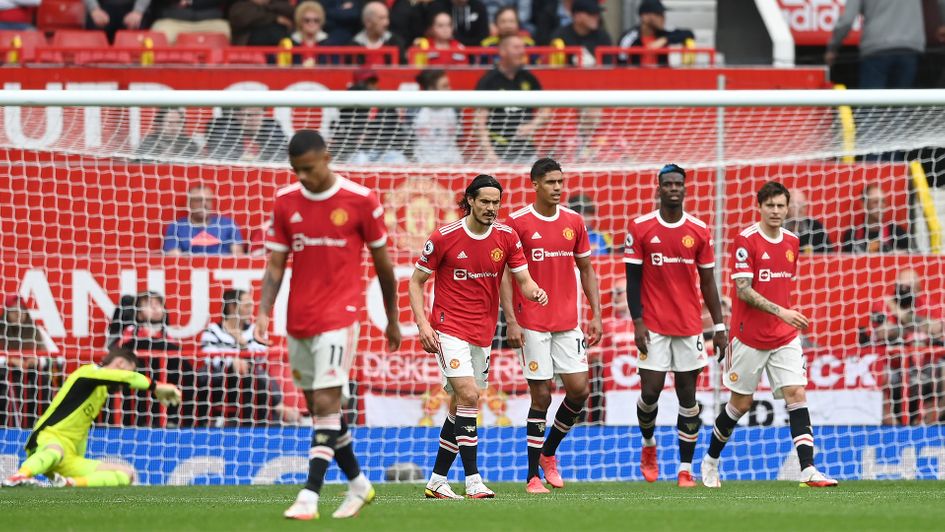
Premier League analysis: Is Ole Gunnar Solskjaer holding Manchester United back?
Every single Aston Villa supporter inside Old Trafford was resigned to their fate.
Manchester United always seem to score a penalty against them. Villa always seem to let a good chance slip against United, whom they had beaten just once in the league since 1995. Bruno Fernandes never misses penalties.
It’s strange how quickly the universe restores its balance sometimes, and after a late penalty miss saved Man Utd last weekend their luck was reversed as Fernandes, blazing over, consigned United to their third defeat in four games.
It was a surreal end to a barmy, absorbing game on Saturday afternoon that saw Villa announce themselves - somewhat belatedly, following a middling start - as European hopefuls and left Ole Gunnar Solskjaer under pressure after a bruising week.
The immediate post-mortem shows more of the same for United; more of the dawdling, more of the puzzled looks and staccato movements.
An elite football club with this many star players really shouldn’t play with so little purpose or collective endeavour, and it is increasingly clear that a team so committed to individualism cannot challenge for major honours; no matter how much talent at your disposal, without a coherent game plan - a shared tactical identity; a central idea drilled and drilled again on the training ground - you will always have days like these.
What is left to say about Solskjaer and United? The knives will be sharpened after this result as the tactical incoherence of his project finally begins to hit the mainstream, but the problems have been presented from his first few months in charge. United are a broken record.
They are not coached automatisms (the set-plays that create structured, high-tempo possession moves) by the manager despite these being the most important frontier of modern tactics.
It puts a ceiling on what he can achieve at the club and Man Utd, now expected to challenge for the title, are clearly bumping up against it. Tussling with Liverpool, Chelsea, and Manchester City through until May is inconceivable.
Aston Villa deserved their win, courtesy of an 89th-minute Kourtney Hause header. Dean Smith’s side turned up with a clear plan and played coherently, Ollie Watkins and Danny Ings causing problems while Matty Cash took advantage of United’s defensive frailty on that flank.
But they are not the headline story today. United’s defeat is a significant one not because it taught us anything new about Solskjaer’s reign but because it may be the moment of critical mass when public opinion catches up with reality.
Man Utd have played eight games in all competitions this season and have played well, have deserved three points, in just two of them. Surely now serious questions will be asked of Solskjaer.
Then again, Solskjaer has a history of putting together a run of wins just when it looks as though the project is waning, so there is always the chance this experiment will carry on, drifting this way and that in the breeze, floating towards nothing in particular.
Tuchel makes a tactical error as Man City dominate
It was surprising to see Chelsea get it so badly wrong and for Thomas Tuchel, usually an inspired in-game tactician, to fail to make the necessary changes until it was too late.
Manchester City were superb at Stamford Bridge, putting in their best performance of the season just at the moment it looked as though their campaign could be heading off the rails.
Pep Guardiola deserves a lot of praise for the way his team created numerous chances, particularly in the second half, and but for some profligate finishing this would have been a dominant win. The 1-0 scoreline flattered the hosts.
There was plenty of logic in Tuchel opting for a 3-5-2 here. It worked very well in the second half against Tottenham last weekend and seemed the right choice to ensure Man City could not build through midfield.
The formation was initially successful as Romelu Lukaku and Timo Werner stayed very close together, blocking the pass through to Rodri, but Man City were able to slowly suffocate the hosts because Chelsea’s front two were isolated.
They had no pass between the lines, nothing connecting Lukaku and Werner to the midfield three, which led to confidence waning and Chelsea’s defensive line dropping deeper. “The attacks were already half-over when the ball reached [Lukaku],” Tuchel said after the match. “We needed the mentality from the start to take risks, they made us underperform and deserved to win.”
The manager’s analysis is correct, in that Chelsea’s retreat and supposed negativity was a psychological issue as opposed to a purely tactical one - which is why it was strange he waited so long to fix it.
That disconnect between midfield and attack was crying out to be solved by moving from 3-5-2 to 3-4-3, but instead of changing at half-time (as he so often does) Tuchel waited until the hour mark. By then, the pattern of the first 45 was already repeating itself and City had scored the winning goal.
For neutrals, this is good news for the title race. Man City have shown they will push all the way; that they have the energy and drive to keep playing Guardiola’s high-risk, high-reward football.
City, Chelsea, and Liverpool are going to give us one of the best battles for the Premier League crown in history. But anyone suggesting it will be a four-horse race is badly mistaken.